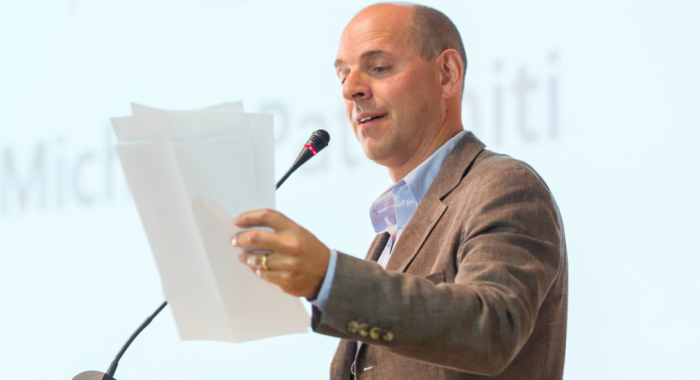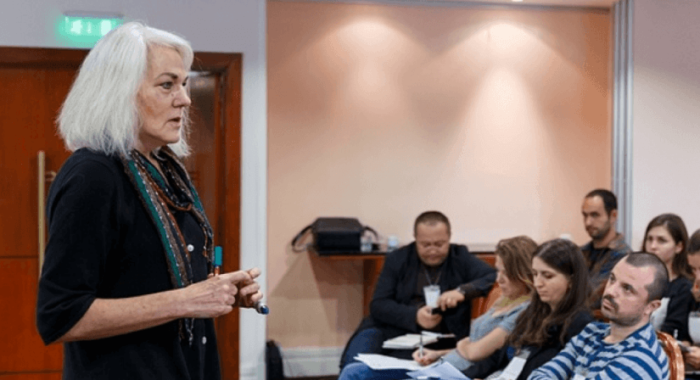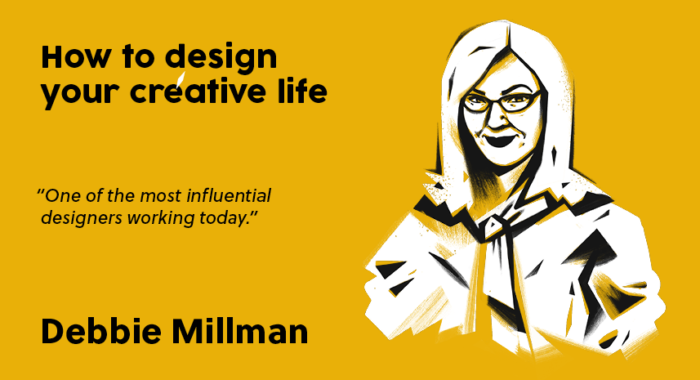When Andy Mills was growing up, he wanted to be a preacher. It was the closest example of a storyteller he had in his small town, where there was no cinema or theatre group and acting jobs were not on anyone’s mind.
“The preacher was this performance role, but more than just being a performer, the preacher was doing a great good for the community and just making people feel connected to a bigger story.”
Mills headed off to a Christian university to figure out what kind of evangelist he was going to become, but along the way, he became more intrigued by other faiths and less interested in his own.
He also became captivated by the idea of storytellers who were not part of any particular tradition, as he realized his religious upbringing had been very narrow.
He fell into journalism after deciding to follow a friend to South Sudan, where he worked as a research journalist for an aid organization in a bid to do some good for the world.
While he started off as a writer in Sudan, Mills says he feels more connected to audio as a way to tell authentic stories.
“It was really hard to capture the emotion that I was experiencing, the tearful words, the cracking of the human voice. And writing is just so damn hard and you have to have the patience for it, and I don’t think I do.”
“After I was in Sudan for a year, I got a job painting houses, and while painting houses I listened to a lot of This American Life. And I realized that it’s a lot easier to convey the emotion of somebody’s experience and their voice if you just record their dang voice, you know, just record it. You can record them for hours and just edit that. It’s a lot more resonant with my character I think, to do that.”
He started producing audio stories from his apartment and sharing them with others whose work he admired. Finally, one of them landed him a gig at Radiolab, which Mills attentively listened to in order to follow their storytelling choices.
Radiolab’s approach to audio storytelling is centered around unlocking the ‘emotional information’, for example recreating a moment of discovery like somebody getting a letter. Their style of presenting stories has been pushing public radio beyond what it traditionally sounds like.
When Mills joined The New York Times in 2016, his team was given a mandate to figure out what the NYT sounded like.
But as Trump’s own mandate had already started to rattle the country, Mills saw in his new role an opportunity to push deeper.
“Quite frankly as a person who grew up in the countryside and now lives in the city, I saw a great disconnect. The people who were around me now, they seemed to have the wrong idea about people who lived in the countryside and there seemed to be an increasing kind of bigotry growing here where people were very intolerant to views that weren’t their own. And I saw that reflected in American journalism and I wanted to get in on that.”
“Luckily the NYT took a big risk by hiring a person like myself. I’m not the kind of smart that a lot of people here are and I have a peculiar background in this world, but it ended up being really great because I feel like I am doing exactly what it was I was aiming to do.”
He joined The New York Times with an idea that would become the boundary-pushing series Caliphate, which follows NYT reporter Rukmini Callimachi documenting ISIS and the fall of Mosul.
The possibility of a daily talk show was also on the table, but the NYT didn’t have a specific recipe in mind yet for combining daily news with audio storytelling.
The Daily was born out of urgency as Trump took office, and the size and the success of the project took the team by surprise. It became Apple’s most downloaded podcast in 2017, won a duPont Award in 2018, and the podcast team now includes six producers.
"The Daily" from The New York Times takes you deeper into the stories of the moment with the journalists on the ground. Listen each weekday at nytimes.com/thedaily
Gepostet von The New York Times am Montag, 27. August 2018
“There was a window where people were more interested in podcasts on the one hand, and people were more suspicious of television news and what they were reading on Facebook.
“We also realized no one had yet cracked this nut of what a daily news podcast should and could sound like. And we didn’t really know either when we went into it.
“We tried a number of things before we really settled on the format we have now of a deep-dive into one story with the reporter who is not just reporting on it, but somewhat living it, who’s as close to it as anybody can be. That kind of surprised all of us when we stumbled into it.”
Mills brought over the idea of emotional information from Radiolab and the team made use of the concept to create a more immersive experience. The use of archive material plays a big role, and storytelling is taken very seriously even in a daily news environment.
But The New York Times tone is also playful.
“You see a lot of that with Caliphate. We took some big risks in terms of sound, in terms of not setting things up, and not signposting.”
As listeners get more used to the medium of podcasting, creators have more flexibility to experiment. Just as film directors can take more liberties with how they set up scenes or cut, so can podcast producers, says Mills.
With Caliphate, there is no signposting for listeners, and no host in the traditional sense. The plot keeps things moving. And, perhaps the most unusual choice for a podcast offering insights into a brutal and gruesome organization, the team also experimented with humor during the series.
“Rukmini, the reporter, she is funny, but her humor is really dark and really weird.
“She is actually a Romanian immigrant to the United States and I wanted to lean into that. I wanted not to hide that aspect of her personality from the listeners so that they can feel even closer to her, but even that was a bit of a risk.”
We combined a list of our favourite podcast episodes produced or reported by #Story18 speaker Andy Mills. Make room for them in your weekend plans. https://t.co/R3A5DAP4Hm
— The Power of Story (@pofstorytelling) August 25, 2018
“Because we have this kind of trope of journalists, especially journalists covering something as serious as the war in Iraq, the enslavement of the Yazidis, and we have this idea that they have to be like the BBC.”
“What if we just don’t? I kept telling her: don’t perform you, be you. Don’t perform the version that you think you’re supposed to be.”
“She was the main character of the show, and I was in some ways just trying to document her, her experience, her insights and her expertise. The sound, the plot, the lack of over-explanation, the fact that there was no traditional host, that there was humor, those are all aspects of the experimentation that we were messing with.”
Andy Mills is speaking at the 8th edition of The Power of Storytelling. Register here to meet him and the other amazing speakers who will tackle this year’s theme: Rewrite.



